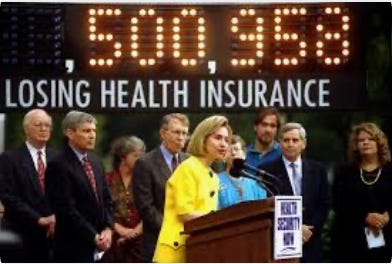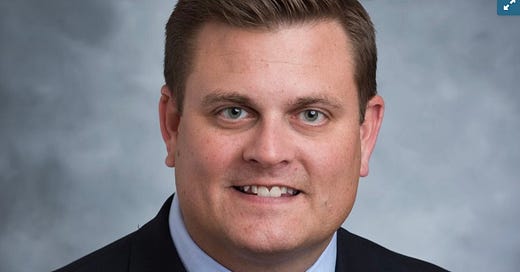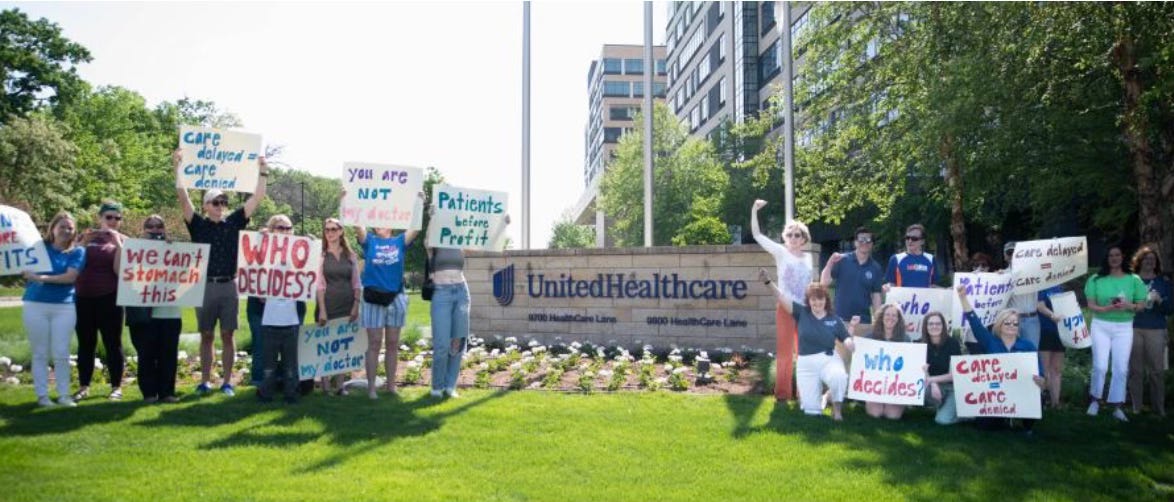Murder in a time of populism
The killing of a healthcare insurance CEO, and the reaction to it, has major implications for our healthcare system and politicians ill equipped to deliver
Brian Thompson was a father, a husband, a Midwestern executive shot dead in the middle of New York City. And yet a friend, who normally shows enormous compassion, told me she was struggling to find any empathy for the death of the UnitedHealthcare CEO.
She wasn’t alone.
Even as Thompson’s killer was on the lam and police were investigating the case, the internet lit up with anger and frustration about the healthcare industry practices. “Unfortunately, sympathy requires a prior authorization, and I have to deny that request,” was just one of many comments.
“Am I a terrible person because I don’t feel bad?” My friend asked me. “I even chuckled at some of those comments.”
She was being honest with me, and asked me not to judge. But for her, working everyday, making on the lower end of 5 figures, with no employer-provided health insurance – seeing a health insurance CEO whose overall compensation package of more than $10 million dollars, money that was tied to the financial performance of the company, a company whose profit often came at individuals’ health expenses — she didn’t feel bad for him.
“I feel bad for his kids,” she said. “I can’t imagine them thinking of their dad lying cold on the ground,” she said.
“But the healthcare system is really fucked up,” she added, “and he was part of that.”
***
In 2024, UnitedHealthcare Group was the largest health insurance company in the U.S. by revenue, generating over $189 billion. One of its subsidiaries, UnitedHealthcare, which Brian Thompson led, was the largest of the group’s portfolios.
In May 2024, UnitedHealthcare Group’s CEO Andrew Witty was called to testify before Congress in the aftermath of a major cyber security breach of its subsidiary Change, the nation’s largest processor of medical claims that processes about 1.5 trillion medical claims annually.
UnitedHealthcare Group’s practices were scrutinized both by Republicans and Democrats — as the largest health data cybersecurity breach at the time affected millions of Americans, the CEO confirmed it affected US Service members and Veterans. A foreign entity had breached its system and CEO Andrew Witty said it pained him to pay the ransom. CEO Witty’s visit was met with protestors chanting “UnitedHealth you can’t hide, we can see your greedy side” and “cover our care.”
ProPublica covered a story about UnitedHealthcare coverage denials in 2023 that centered on the story of Christopher McNaughton, a student at Penn State University, who fell ill, and struggled to get the care he needed covered.
McNaughton’s family sued and the discovery uncovered correspondence that could have been seen as business as usual by the employees — back and forths on denials, one employee called McNaughton’s mother “this woman” saying she was “screaming and yelling” and “throwing tantrums.” For the mother, this was not business as usual. This was about her son struggling for his life.
There was a person of interest in the death of Brian Thompson who was taken into custody Monday. Luigi Mangione had used the fake ID police connected with the New York suspect when confronted. It is alleged he had weapons when arrested, and a three page manifesto that outlines a motive.
As reporters dug into Mangione’s past, he had been the Valedictorian of his private high school, the Gilman School in Baltimore. His father owned a country club. His cousin Nino Mangione was recently elected into the Maryland House of Delegates as a Republican. It was that cousin who delivered the statement attributed to his family: “Our family is shocked and devastated by Luigi’s arrest. We offer prayers to the family of Brian Thompson and we ask people to pray for all involved.”
Luigi Mangione’s LinkedIn profile indicates he worked as a data engineer in California, having received prestigious degrees from the University of Pennsylvania, and he is reported to have been living in Hawaii.
There are still many questions about Mangione, the murder, and the aftermath continues to unfold. But by the end of the week of Thompson’s murder, security firms were reporting a massive increase in interest in executive protection.
***

In 2008 President Obama had vowed to take on the taboo issue of healthcare reform. Hillary Clinton had tried, as First Lady she led a campaign to tackle healthcare reform, one that famously fell apart. She was widely panned for her efforts and it haunted her in her Presidential bid.
By 2009 Americans faced crushing healthcare debt. Every 30 seconds an American would go bankrupt by not having the coverage they thought they had, with no coverage for pre-existing conditions, significant denials. Young people who lacked coverage would face a diagnosis that could — even if they could rectify the medical issue — cause them a lifetime of financial issues.
Obamacare was designed to address this crisis. Despite the clear problem, President Obama found an unwilling party in Republicans to negotiate a solution. There was a mix of things going on — ideological opposition, but also raw politics — the desire by Republicans to deny a new President a political win.
President Obama grew frustrated and as a result we opened President Obama’s visit with the House Republican Caucus to the press. Obama used the meeting to plead with them to come to the table on healthcare.
Despite his efforts, and perhaps because Republicans were not convinced with the engagement (we learned the hard way that bringing cameras didn’t force action), only Democrats would ultimately pass Obamacare, which would plug the hole on pre-existing conditions, draw certain requirements from insurance companies, and in an effort to get everyone including young people insured, it would require individuals to buy a private healthcare plan. The plan borrowed key elements of Massachusetts Gov. Mitt Romney’s healthcare plan, and wasn't the single payer system some Democrats wanted.
During President Obama’s re-elect in 2012, Obamacare was a political liability, but as it was implemented and the benefits were enjoyed, it became more popular. When my own parents found coverage through Obamacare, and my Republican dad praised the plan. He wouldn’t have insurance if not for this plan, he told me.
***
Republicans had long pledged to repeal Obamacare.
President Obama’s 2008 opponent, John McCain, who would later die of the brain cancer that was slowly killing him, was the deciding vote against the Obamacare repeal effort during President Trump’s first term. There was never a replacement plan offered. And Americans have still had issues with the healthcare system and getting coverage.
President-elect Donald Trump addressed healthcare during the campaign at the only Presidential debate with Kamala Harris when he said he had “concepts of a plan” when it came to healthcare. Concepts won’t cut it.
The reaction to Thompson’s murder offers a small window into people’s deeply felt anger and dissatisfaction with a system that, while there have been minor improvements for some, hasn’t changed nearly enough post Obamacare.
A 2024 Gallup poll found that more than 75% of Americans believe the healthcare system needs significant reform. The majority of Americans also say they want the government to ensure healthcare. And even polls of Trump supporters — a more populist version of the Republican party — show a percentage want a public option for healthcare.
Are President Trump and his team ready to deliver on the change the public is calling for? This weekend on Meet the Press he was asked about healthcare. He ripped Obamacare but, as has been the case, was light on specifics.
Trump said: “When John McCain let us down by voting, and Murkowski and Collins, and whoever it was that voted against, but they really let us down. They did us a great disservice, because we would’ve had great health — Obamacare is lousy health care. It’s very expensive health care for the people.”
He added, “Just let me just tell you, if we find something better, I would love to do it.”
When asked if he had more than concepts of a plan now, he said he had doctors working on it.
There’s no sign — for all the populism and outcry — that Trump will introduce a healthcare plan that can bring down the cost for individuals, cover the cost of life-saving healthcare, and hold powerful companies accountable.
My friend who was struggling to feel empathy for UnitedHealthcare CEO Brian Thompson in the aftermath of the murder was torn about her feelings.
“I mean I don’t think we should be taking this into our own hands, vigilante style, but how can it change?”
That’s the $4.8 trillion question (the amount spent on healthcare last year, approximately 17.3% of the GDP): Whether politicians — or companies themselves — will act to actually change. Can they ignore the sentiments that followed Brian Thompson’s murder? Are they ready?







